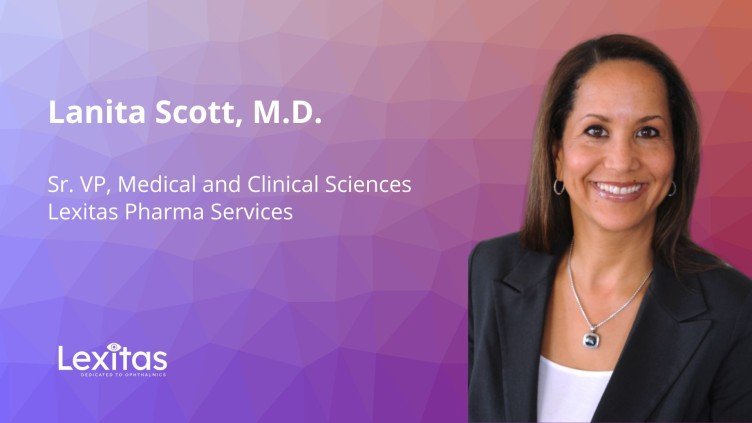Lanita Scott, M.D. – Maximizing the Likelihood of Success for Your Ophthalmology Studies

Dr. Lanita Scott recently joined Lexitas Pharma Services as Sr. Vice President of Medical and Clinical Sciences. We sat down with Lanita to learn more about key issues in the industry and her plans for Lexitas.
Welcome to Lexitas, Lanita! You have extensive experience in various clinical and medical positions at companies such as Adverum, Regeneron, Genentech, AGTC, and others, with a focus on ophthalmology. What is one highlight that stands out to you?
My first role in the life sciences industry was on the Lucentis launch team at Genentech. It was tremendously rewarding to help bring a sight-saving drug to patients. My grandmother went blind from AMD, so this was both a professional and personal achievement.
Vision care has always been important in my family. I started my career in ophthalmology working alongside my father, also an ophthalmologist and glaucoma specialist. But I realized I could have a greater impact on patients if I transitioned to biotech. Since that time, I have had broad experiences in global medical affairs and clinical development working on new drug indications in ophthalmology, gene therapy, retina, inherited and rare diseases.
What will your role at Lexitas be?
It’s an exciting mix of responsibilities. For one thing, I’ll be working and consulting with sponsors, KOLs and investigators on clinical development strategy and protocol development. I will also have oversight of our medical monitoring program, as well as provide strategy, leadership and support for the Lexitas Reading Center. And I also look forward to working with the global ophthalmology community on behalf of Lexitas.
Why did you pick Lexitas?
Having worked exclusively on the sponsor side, I was drawn to Lexitas as their focus is to work with and for ophthalmology clients. The philosophy and focus of Lexitas is a huge asset to any ophthalmology sponsor working on trials to bring new drugs to patients and physicians. The employees at Lexitas truly care about each other, the programs they are working on, achieving their goals, maintaining strong relationships and meeting key deliverables.
Here at Lexitas, I plan to leverage my experiences from the sponsor side to contribute to its global growth and help turn it into a world-class ophthalmology product development organization.
What are some of the key challenges that you see out there and how can they be addressed?
One of the systemic problems I see in studies is the lack of diversity in clinical trials. It is important to work at building trust in medical research in minority and underrepresented communities. This includes engaging with the physicians who treat these patients. It will allow an increased capacity to include more patients in clinical trials and ultimately exceed enrollment timelines.
It’s a pretty important issue and I think Lexitas can target, engage and train new sites. The upside is more diversity and enrollment opportunities for ongoing studies.
Do you have any practical advice for sponsors when looking to work with an ophthalmology product development partner?
As a sponsor who has worked with many CROs, I think it is critical to understand the experience of the team that you’ll be working with. First of all, it should be broad and include clinical, medical, regulatory and medical writing, biostatistics, and clinical operations. In evaluating a CRO, it is important to understand what specific ophthalmology experience they bring to your program. And how they will continue to interact with you. How will your questions be addressed? Will you have easy access to the same experts you engaged with while bidding for the project? These are critical questions to address in preparing to run any clinical trial, but especially in a unique subspecialty like ophthalmology.
I believe it is important to engage the CRO early and include strategic thinking as soon as possible. Take protocol writing, for example. You want to avoid unnecessary protocol revisions after a study has begun enrollment. An experienced writer and trialist can anticipate many things in advance which ultimately save significant time and money in the study.
Another really important matter is to consider the extent of the ophthalmology expertise the organization has. There are lots of CROs out there, but ophthalmology is such a unique therapeutic area that many won’t really know what they are doing. You can’t just take the cookie-cutter approach and apply your experience from other specialties. That’s why I think it’s generally better to work with an ophthalmology-focused product development partner who can really provide that deep strategic and clinical guidance for your study.
That’s great. And finally, what are some of your personal interests?
My daughter is graduating from college in May, so I think I am officially an empty nester. But that might give me a chance to do more of the activities I’ve always enjoyed. Growing up in California, I spent many vacations houseboating, camping, water and snow skiing with my extended family and friends. Outside of work, I enjoy traveling and have a bucket list of places still to explore. On a warm or sunny day, you can find me outside walking, hiking, biking or rollerblading.
Thank you very much for your time, Lanita.
Our In Focus newsletter is published once a month on LinkedIn and has nearly 2,000 subscribers. To help you keep in touch, you can subscribe here.
